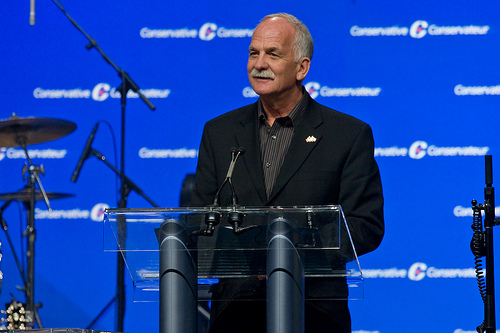About a week ago, Public Safety Minister Vic Toews overruled a decision made by the warden of Millhaven Institution, also known as Guantanamo North, and refused an interview request by the Canadian Press to speak with Omar Khadr over the phone.
This refusal was justified by the Minister’s office because of security concerns.
I am still trying to figure out how speaking on the phone from a maximum security prison can pose a threat to Canadians. Does it insinuate that Khadr will speak in encrypted messages to the journalist and to some shadowy accomplices? Or does it mean the interview poses a threat to the intelligence of people?
One has to remember that the refusal of the interview came a few days after the speedy approval of the very controversial anti-terrorism bill S-7. So maybe, the government was so excited to see the bill passed amidst the growing fears created by the Boston Marathon attack and the sudden arrest of two Muslims suspected as terrorists, and thus didn’t want to wreck the perfect atmosphere by allowing an ex-Guantanamo detainee to tell his story and nuance the whole debate geared for tighter security measures.
There is no doubt that the refused Khadr interview will bring to the table the use of torture that many security experts still depict with a fancy and elaborate word like “enhanced interrogation techniques”. Khadr’s personal story, one that so far no one knows in detail, will speak to the intelligence of people rather than create security threats. It will make Khadr look more like a human being and a child soldier caught in a labyrinth of violence and war. Regardless of the guilt or innocence of Khadr, Canadians have the right to hear his story and make their own judgment. Canadians do not need a minister’s office to tell us what to read or to protect them from some “dangerous” reading.
But what we really need to know is that this new anti-terror legislation was sleeping for a while on the shelves of Parliament without finding any reasonable incentive to table it. The “Boston Marathon attack” awoke it and gave the government the perfect “national security alibi” to make it a priority. What about the backbencher rebellion brewing within the ranks of the government’s own parliamentarians? What about the motion that was to be voted on at the same time and that would have stripped party whips of the power to decide which MPs are allowed to make members’ statements in the House of Commons? The government decides once again, for our own security, that these issues were not worth discussing. Perhaps this time, these discussions were more dangerous to the government itself than to us.
Bill S-7 allowed “preventive detention” and “investigative hearing” — two clauses that already existed in the anti-terror legislation (Bill C-36) passed by Jean Chretien’s government after the events of 9/11. These clauses were sunset in 2007. At that time, Canada was trying to trying to re-adjust the pendulum back to the human rights side after Canadians heard horrific stories of Canadians being imprisoned, tortured and deported under the name of national security.
Today, Vic Toews didn’t want Canadians to hear similar stories of torture and mistreatment. He didn’t want Canadians to know the truth; he wanted them to simply dig their heads under the sand and have the false impression that censorship will make us safer.
Monia Mazigh was born and raised in Tunisia and immigrated to Canada in 1991. Mazigh was catapulted onto the public stage in 2002 when her husband, Maher Arar, was deported to Syria where he was tortured and held without charge for over a year. She campaigned tirelessly for his release. Mazigh holds a PhD in finance from McGill University. In 2008, she published a memoir, Hope and Despair, about her pursuit of justice, and in 2011, a novel in French, Miroirs et mirages.
Photo: mostlyconservative/Flickr




